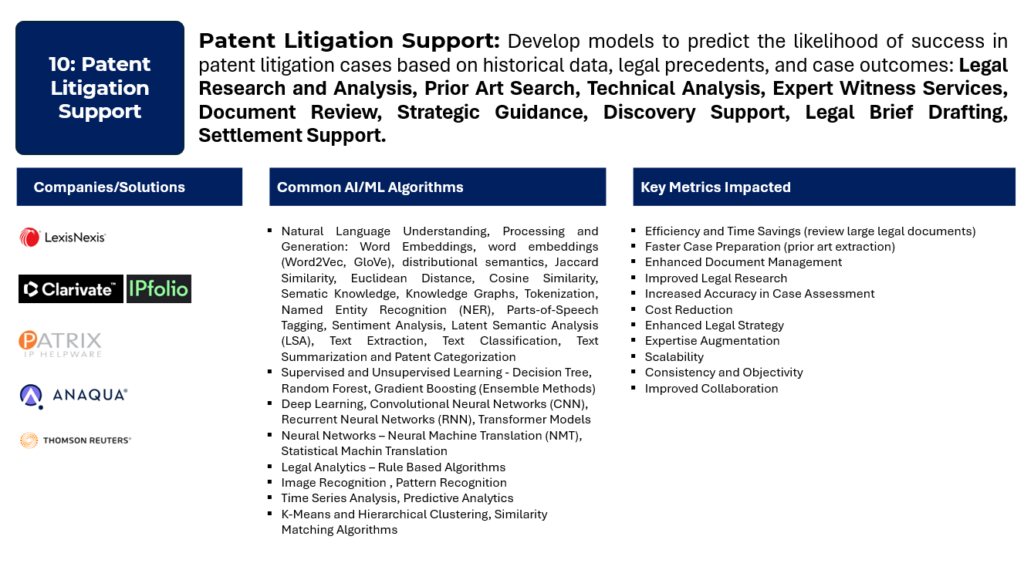Artificial Intelligence (AI) and Machine Learning (ML) can significantly impact patent management by automating and optimizing various tasks. By leveraging AI and ML in these areas, patent management processes can become more efficient, accurate, and proactive, ultimately enhancing the overall effectiveness of intellectual property management strategies. There are several applications and areas where AI/ML can be applied in patent management: Prior Art Search, Automated Patent Drafting, Patent Classification, Patent Valuation, Automated Patent Filing and Prosecution, Patent Portfolio Management, Patent Analytics, Infringement Detection, Technology Landscape Analysis, Patent Litigation Support, Automated Patent Maintenance and Collaborative Innovation Platforms.
J: Patent Litigation Support
Develop models to predict the likelihood of success in patent litigation cases based on historical data, legal precedents, and case outcomes.
Patent litigation support refers to the assistance provided to parties involved in legal disputes or litigation related to patents. Patent litigation is a legal proceeding that typically arises when a party believes that their patent rights have been infringed upon by another party. The patent holder (plaintiff) may file a lawsuit against the alleged infringer (defendant) to seek legal remedies, such as injunctions, damages, or licensing agreements. Patent litigation can be complex, involving legal, technical, and procedural aspects. Patent litigation support services are designed to help parties navigate the complexities of the legal process and build a strong case.
Patent litigation support services aim to strengthen the legal position of the parties involved, whether they are asserting patent rights or defending against allegations of infringement. Legal professionals, technical experts, and support staff collaborate to build a compelling case, present evidence, and navigate the legal proceedings effectively. The goal is to achieve a favorable outcome for the client, whether through settlement, licensing, or a court judgment. Patent litigation support involves Legal Research and Analysis: Conducting legal research to understand relevant patent laws, precedents, and case law. Analyzing the legal merits of the case and identifying legal arguments for or against infringement. Prior Art Search: Conducting a thorough search for prior art to assess the validity of the patent in question. Identifying relevant prior art that may impact the validity or enforceability of the patent. Technical Analysis: Analyzing the technical aspects of the patent, including claim construction and interpretation. Assessing the technical differences or similarities between the patented invention and the accused infringing product or process. Expert Witness Services: Engaging technical experts to provide opinions on the technical aspects of the case. Expert witnesses may testify in court to support or challenge technical arguments related to patent infringement or validity.
Document Review and Management: Reviewing and managing documents related to the patent, prior art, and the accused infringing product or process. Organizing and presenting relevant documents as evidence during the litigation process. Strategic Guidance: Providing strategic guidance to legal teams on case strategy, including potential strengths and weaknesses. Advising on settlement negotiations, licensing agreements, or alternative dispute resolution methods. Discovery Support: Assisting in the discovery process, which involves gathering and exchanging relevant information between the parties. Managing and analyzing documents, emails, and other evidence that may be used in the litigation. Litigation Technology Support: Utilizing technology tools for case management, e-discovery, and data analysis. Implementing technologies that aid in presenting complex technical information during legal proceedings. Legal Brief Drafting: Assisting in the preparation of legal briefs, pleadings, and motions. Drafting documents that present legal arguments and evidence in support of a party’s position. Settlement Support: Assisting in settlement negotiations and evaluating the terms of potential settlements. Providing analysis on the potential risks and benefits of settling the patent litigation.

The field of legal technology, including patent litigation support, is dynamic, and new developments may have occurred since then. However, some legal tech companies and platforms integrate AI and machine learning capabilities to enhance various aspects of legal support services, including those related to patent litigation. These platforms often leverage advanced technologies for tasks such as document analysis, legal research, and case strategy optimization. When looking for solutions in this space, consider established legal tech providers that continuously update their offerings. AI/ML automates time-consuming tasks, such as document review and legal research, leading to significant time and cost savings.AI provides data-driven insights, empowering legal professionals to make informed decisions about case strategy, settlement negotiations, and expert witness selection. AI assists in efficient case preparation by automating tasks such as prior art searches, invalidity analyses, and document review. Predictive analytics models enable attorneys to develop stronger case strategies by considering historical litigation outcomes and trends. AI tools help identify expert witnesses with the most relevant expertise, improving the quality of expert testimony in patent litigation. AI/ML technologies are transforming patent litigation support by providing legal professionals with advanced tools for research, analysis, and decision-making. Companies like ROSS Intelligence, LexisNexis, and EVA exemplify the integration of AI into platforms designed to support patent litigation activities.
ROSS Intelligence uses AI to provide legal research and case law analysis tools, helping attorneys quickly find relevant information for patent litigation. Improves the efficiency of legal research and supports attorneys in building stronger legal arguments. LexisNexis integrates AI into its legal research platform to provide attorneys with comprehensive access to legal documents, case law, and precedents. Enhances legal research capabilities, enabling attorneys to stay well-informed during patent litigation proceedings. EVA (Estimation of Patent Value) is an AI-driven platform that provides analytics and insights into patent portfolios, helping legal professionals assess the strength of patents in litigation. Assists in evaluating the potential impact of patents on litigation outcomes.
Companies like Westlaw, LexisNexis, and Fastcase provide legal research services, and while they may not exclusively focus on patent litigation, they may leverage AI for legal research support. E-discovery platforms like Relativity, DISCO, and Everlaw may use AI/ML for document review, analysis, and management in the context of patent litigation. Platforms such as Lex Machina or Bloomberg Law incorporate analytics to provide insights into litigation trends, judge behavior, and case outcomes. Companies like Anaqua, IPfolio, or Patrix specialize in intellectual property management and may integrate AI for patent-related legal support.
Automating patent litigation support involves the application of various AI/ML algorithms to streamline processes, analyze large datasets, and extract valuable insights. It’s worth noting that the effectiveness of these algorithms often relies on the quality and relevance of the training data, as well as the expertise of legal professionals who guide and validate the AI/ML-assisted processes. Integrating these algorithms into patent litigation support can lead to increased efficiency, reduced costs, and enhanced decision-making throughout the litigation process: Natural Language Processing (NLP): Understanding and processing human language in legal documents. Extracting key information, summarizing documents, and analyzing the language used in patents and legal briefs. Text Classification: Categorizing legal documents into predefined classes. Automated categorization of legal documents for efficient document management and retrieval. Named Entity Recognition (NER): Identifying entities (e.g., names, organizations, locations) mentioned in legal texts. Extracting and cataloging key entities related to patents, inventors, and companies. Machine Learning for Document Review: Automating the review and analysis of large document sets. Identifying relevant documents, assessing the significance of evidence, and categorizing documents based on relevance to the case.
Predictive Analytics: Forecasting case outcomes, litigation risks, or potential settlement scenarios. Predicting the likelihood of success in a patent litigation case based on historical data and case-specific factors. Pattern Recognition: Identifying patterns in legal documents, patent claims, or prior art. Recognizing recurring elements that may strengthen or challenge legal arguments. Semantic Analysis: Understanding the meaning and context of legal language. Enhancing the precision of searches, identifying semantic relationships between legal terms. Supervised Machine Learning: Training models using labeled data to make predictions or classifications. Predicting outcomes, classifying legal documents, and providing support in decision-making processes. Legal Analytics: Analyzing legal data to derive insights into case strategies, judge behavior, and litigation trends. Providing data-driven insights for case assessment, strategy development, and decision-making. Document Similarity and Clustering: Identifying similarities between legal documents and clustering related documents. Grouping similar patents, prior art, or legal cases for efficient analysis. Predictive Coding for E-Discovery: Automating the review and categorization of documents in e-discovery. Accelerating the identification of relevant documents during the discovery phase of patent litigation. Expert Systems: Incorporating expert knowledge into rule-based systems.Developing systems that emulate the decision-making processes of legal experts, providing guidance in complex legal scenarios.
Automating patent litigation support using AI/ML offers several benefits that can enhance the efficiency, accuracy, and overall effectiveness of the litigation process. By leveraging AI/ML technologies in patent litigation support, organizations can streamline their legal processes, gain valuable insights, and ultimately enhance their ability to navigate complex patent disputes effectively. The combination of human expertise and AI/ML capabilities creates a powerful synergy in the legal domain.: Efficiency and Time Savings: Automated Document Review: AI/ML algorithms can quickly review and analyze large volumes of legal documents, reducing the time and effort required for manual document review. Faster Case Preparation: Automation accelerates various aspects of case preparation, such as document categorization, identification of relevant prior art, and data extraction.Enhanced Document Management: Document Organization: AI/ML helps in organizing and categorizing legal documents, making it easier for legal professionals to locate and retrieve relevant information during litigation. Reduced Data Overload: Automation helps filter out irrelevant information, reducing the risk of information overload and improving focus on key aspects of the case.
Improved Legal Research: Efficient Prior Art Search: AI-powered tools can conduct comprehensive prior art searches, identifying relevant patents and references more quickly and accurately than manual methods. Legal Research Optimization: AI/ML algorithms can assist legal professionals in finding relevant case law, statutes, and legal precedents efficiently. Increased Accuracy in Case Assessment: Predictive Analytics: AI/ML models can analyze historical case data to predict likely case outcomes, helping legal teams make more informed decisions about case strategies. Risk Assessment: Automation aids in identifying potential risks and strengths in a case, allowing for better risk management and strategic planning.
Cost Reduction: Efficient Resource Utilization: Automation reduces the need for extensive manual labor, leading to cost savings in terms of time and human resources. Lower Discovery Costs: E-discovery processes can be streamlined and made more cost-effective through the use of AI/ML algorithms for document review and categorization. Enhanced Legal Strategy: Data-Driven Insights: AI/ML analytics provide data-driven insights into litigation trends, judge behavior, and case strategies, enabling legal teams to evelop more effective and informed legal strategies. Strategic Decision Support: Automation assists in assessing the potential impact of legal decisions, helping legal professionals make strategic decisions aligned with organizational goals. Expertise Augmentation: Technical Expertise: AI/ML can assist legal professionals by providing technical expertise in patent-related matters, helping with the analysis of complex technical documents and prior art. Legal Research Support: Automation tools complement legal expertise, facilitating more comprehensive legal research and analysis.
Scalability: Handling Large Datasets: AI/ML technologies are well-suited for handling vast amounts of data, making them scalable to address the challenges posed by large patent portfolios or extensive prior art databases. Adaptability to Case Complexity: Automated systems can adapt to the complexity of various patent litigation cases, providing consistent support across different scenarios. Consistency and Objectivity: Reduced Human Bias: Automation reduces the risk of human bias in document review and legal analysis, promoting more objective and consistent decision-making. Standardized Processes: Automated processes ensure a standardized approach to document categorization, analysis, and information extraction. Improved Collaboration: Collaborative Tools: AI/ML-powered collaboration tools facilitate better communication and coordination among legal teams, experts, and other stakeholders involved in patent litigation.
References
Patent Litigation Support:
Book: “Patent Litigation in China” by Douglas Clark
Article: “Role of Artificial Intelligence in Patent Litigation” by Sudhindra B. Holla (Journal of Intellectual Property Rights, 2020)
Webinar: “AI and Patent Litigation: Current Trends and Future Implications” by IPWatchdog
Course: “Patent Litigation: Strategies and Tactics” on American Bar Association (ABA)
Blog Post: “AI in Patent Litigation: A Game Changer” by Finnegan




